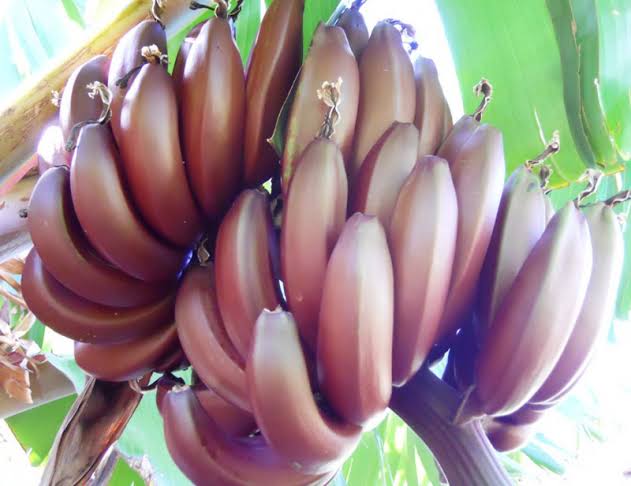Banana - Jamaican Red Dwarf
- Regular price
-
$190.00 - Regular price
-
- Sale price
-
$190.00
Couldn't load pickup availability
Jamaican Red Dwarf stands out among the various red-skinned banana cultivars due to its compact size, making it an excellent choice for those with limited space. Renowned for its delectable fruit, this cultivar shares the esteemed reputation of most red bananas. Notably, 'Dwarf Red' features red pseudostems, adding to its visual appeal. The most distinctive aspect of this banana variety lies in its remarkably large leaves, setting it apart from others.
To ensure optimal ripeness, the skin should ideally attain a dark red hue before consumption. The bananas are of an excellent eating quality, and are medium sized, creamy, sweet and have a fantastic flavour. Beyond its delicious fruit, the thick leaves of the Jamaican Red Dwarf banana serve a practical culinary purpose. They prove to be excellent for wrapping and grilling meats, enhancing the versatility of this unique cultivar.
This cultivar goes by various names worldwide, such as Cuban Red, Jamaican Red, Colorado, Indio, and Macaboo. In terms of size, 'Dwarf Red' Banana lives up to its name, reaching a maximum height of approximately 2.6 meters. This compact stature, coupled with its exceptional flavor and versatile leaves, makes 'Dwarf Red' a sought-after choice for banana enthusiasts and gardeners alike.
Banana Plant Care Tips
-
Sunlight: Banana plants thrive in full sun, so it's best to plant them in an area that receives at least 6-8 hours of direct sunlight per day.
-
Soil: Banana plants prefer well-drained soil that is rich in organic matter. A pH range of 5.5-7.0 is ideal for optimal growth.
-
Watering: Banana plants require regular watering, especially during the growing season. Keep the soil moist, but not waterlogged. Overwatering can cause the roots to rot.
-
Fertilizer: Banana plants are heavy feeders and require regular fertilization. Apply a balanced fertilizer every 4-6 weeks during the growing season.
-
Mulching: Mulch around the base of the plant to help retain moisture and suppress weeds.
-
Pruning: Remove any dead or damaged leaves and suckers (smaller offshoots that grow from the base of the plant) regularly. This will help promote healthy growth and prevent disease.
-
Pests and diseases: Banana plants are susceptible to a variety of pests and diseases, so it's important to monitor the plant regularly for any signs of infestation or disease. Common pests include aphids, spider mites, and mealybugs, while common diseases include Panama disease and Sigatoka leaf spot.
-
Harvesting: Bananas are typically harvested when they are fully ripe and the skin is yellow. Cut the bunch off the plant with a sharp knife and allow the fruit to ripen further at room temperature.








